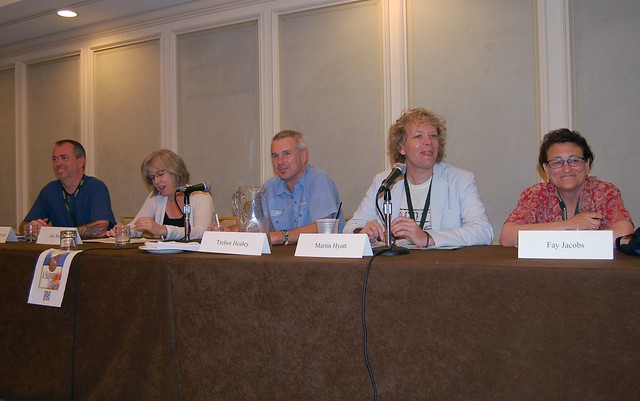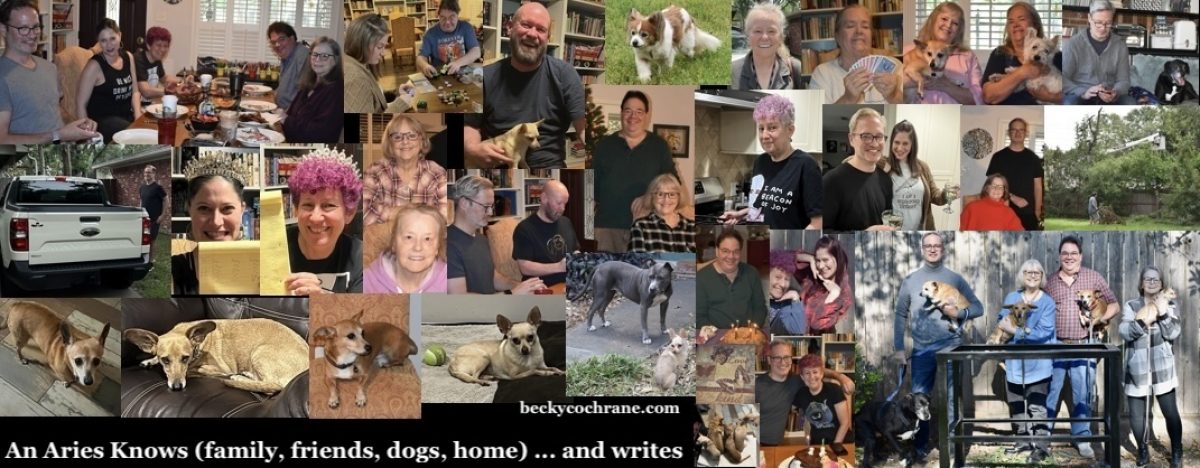This morning I was reading a blogger who provided a list of “unfortunate” things people say to artists. They seemed all too familiar and applicable to writing, as they are designed to make the creative person feel bad about how much time s/he spends on a “hobby,” how much artistic work costs the consumer, and what different choices the creative person should or could make. (“You should paint landscapes.” “You should write a book like Dan Brown.” “You should write pop music.”) I’m sure we’ve all heard these, not only from strangers but from people who say they care about us and who should know better.
The practical challenges of life as balanced with writing was the topic of the Saints & Sinners panel “There and Back Again: Surviving and Loving Your Writing Career.” Moderated by Michael Thomas Ford (What We Remember; Changing Tides; Full Circle; Looking for It; Last Summer; Suicide Notes), the panelists were Trebor Healey (Through It Came Bright Colors; A Horse Named Sorrow; Faun; Sweet Son of Pan), Martin Hyatt (A Scarecrow’s Bible; Beautiful Gravity), Fay Jacobs (publisher A&M Books, author of As I Lay Frying: a Rehoboth Beach Memoir; Fried & True: Tales from Rehoboth Beach; For Frying Out Loud: Rehoboth Beach Diaries), and Jess Wells (writing teacher and author of The Mandrake Broom; AfterShocks; The Price of Passion).

This panel was filled with so much lively discussion that there’s simply no way I can do justice to it all. So here are some key points that I took away.
You can be published. There’s no conspiracy to keep your work away from the public. There’s no clique you have to join to have your writing read and accepted for publication. If you write a good story or a good novel, it will find a home. But first, you have to actually write it, not talk about it, not resent others who are doing it, not make excuses for why you’re not. And then you have to hone it, using beta readers, paying proofreaders, joining writing groups, attending writing workshops, whatever it takes. Then you have to submit it. The burden is on you to find your market. It’s easier than ever with the Internet to find agents to query, calls for submissions, addresses and guidelines for small presses, university presses, and mainstream publishers or periodicals that publish shorter works. And if you don’t want to put all that effort into finding someone to publish you, publish yourself. It’s never been easier to do that, either, and it’s no longer cost-prohibitive as were the vanity presses of old. Once again, the Internet has provided opportunity in the form of e-publishing.
In all likelihood, a lifelong writing career won’t be easy or lucrative. You may have to keep other jobs, or a series of jobs, for an income that will keep a roof over your head and food on your table, or provide you with health insurance or medical care, pay vet bills and buy your clothes and some degree of entertainment in life. This may require creative juggling, but it can be done. A lot of prioritizing goes into being creative, and sometimes forming a supportive community with other creative people can benefit everyone. That doesn’t mean someone else will pay your bills (unless you have wealthy creative friends, and that’s kind of rare), but it does mean that sometimes you can help one another out with a meal, childcare, a ride, bartered services, or just as necessary, an encouraging and understanding ear.
Just because you often work in your pajamas doesn’t mean you don’t have to be a professional. Regard yourself and your work as having worth and behave accordingly. Don’t be petty and jealous and snarky about other people’s success. The writer you’re being a jerk to may be editing an anthology you could submit to next year. The quiet person in the corner who’s listening to you belittle your peers may be an editor at a publishing house in Manhattan. That guy you shoved aside to get to the Famous Writer at an author appearance could be looking for novels to turn into screenplays. That person you didn’t push the OPEN button for as the elevator doors were closing may be a bookseller who’s part of a word-of-mouth network that can help build your career. That unknown ISP address reading the badly spelled and poorly punctuated diatribes on your blog may be an agent willing to represent new writers.
Believe in your work. Believe in yourself. Know that there will be disappointments. The story that’s rejected. The book deal that falls through. The publisher that closes. Know there are costs to any art, and honestly, they never stop. The musician pays for instruments and lessons, the vocalist pays for voice coaches, the artist and sculptor pay for materials, and the writer pays for classes and research and usually a computer. And sometimes there’s a cost to get our work out there: the CDs to sell at the bar where your band plays, the fee to exhibit at the art fair, the cost of a writer’s workshop or some editing services or cards to promote a book signing.
Only you can decide if you want to take this on. I’m relatively sure every person who was sitting in that room with me, panelists and audience alike, believe that if writing is your passion, it definitely is all worth it.

You could have written this post for me.
I hope that’s a good thing!
It is indeed.
So many who should learn from you never will, even if they read this.
Thank you. It is a sad fact of life, at least in the US, that by the time you’ve gained some experience and wisdom, you’re too old to be listened to. Probably on my home planet, this is different.